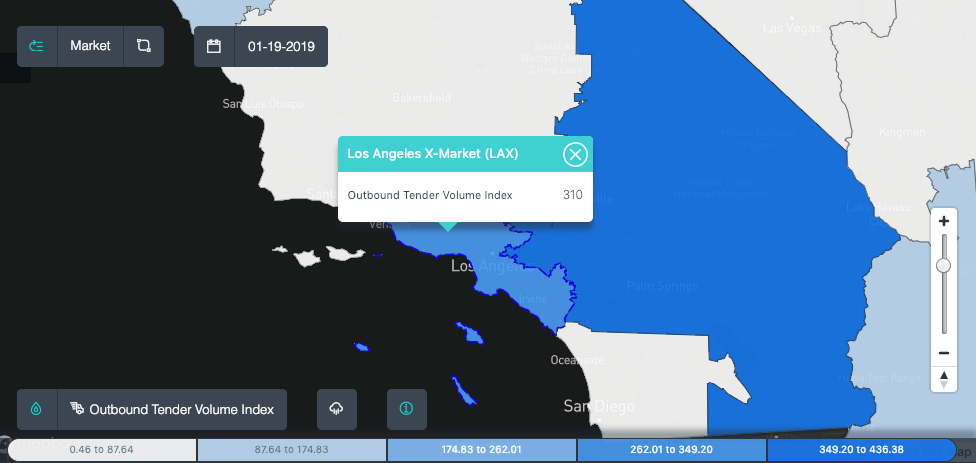If you wonder where all the truck drivers have gone, look no further than U.S. ports where severe congestion is keeping drivers idled as they wait to drop off and pick up containers.
The number of containers coming into the U.S. bodes well for intermodal and other freight carriers concerned about a slowdown to start the year. But shippers and motor carriers are facing ever-higher costs and frustrations as major marine terminals deal with the increased cargo flow.
Third-party logistics provider STG Logistics warned last week of an "unprecedented uptick in import volumes" into the Port of New York and New Jersey. The uptick comes as shippers bring in more goods ahead of a slowdown in Asia exports during China's Lunar New Year, and the still unsettled matter of whether the U.S. will impose higher tariffs on Chinese goods.
On the west coast, STG Logistics says it is having to pay a "substantial amount" of demurrage due to empty container returns being delayed due to congestion. As a result it plans to increase pay to drayage providers "to recruit the additional drivers needed to work through the congestion at the port and alleviate the empties in our yards."
Similarly, freight forwarder Flexport warned it is seeing "extreme congestion at Los Angeles/Long Beach [LA-LB] and New York ports" due to the import volumes.
The freight influx is a mixed blessing for local motor carriers and drivers. While the number of loads is up, the congestion and delays mean drivers can retrieve fewer loads overall.
"If it's going to take a driver five hours to get in and out, it trims down how much they can make in a day," said an operations manager for an Atlanta-based logistics provider. "It really decreases what drivers are willing to do."
The delays are pushing up costs throughout the supply chain. Ocean carriers and terminals are charging rates between $100 to $250 per day for shippers that are delayed in returning or picking up containers. Likewise, drayage carriers are charging wait fees of $75 per hour for drivers sitting idle at terminal queues.
Carl Frederick, who has brokered drayage services at New Jersey ports for 30 years, says the added fees set the stage for future billing disputes between shippers, logistics firms and motor carriers
Logistics and forwarders "are going to get whacked for the costs," Frederick said. "Whether or not a motor carrier can pass on those costs is another issue because you are going to get a lot of flack for charging driver detention."
The Harbor Trucking Association says truck turn times at LA-LB terminals averaged 90 minutes during the fourth quarter, the highest level since July 2017.
An executive for a Los Angeles-based drayage carrier who spoke on condition of anonymity says turn times are still at those levels during January. With truck and driver supply static, "the same fleet can't pull out as many containers as when it's a 70-minute turn time," he says.
The executive continued, "You slow up turn times and productivity, and we'll never have enough trucks."
With the additional detention and per-diem fees, a $300 or $400 drayage move from the Port of Los Angeles to nearby Carson can cost upwards of $1,000 after other fees are tacked on.
He says all the major container terminals in Southern California, including Total Terminals International and West Basin Container Terminals in Long Beach, have issues. But APM Terminals in Los Angeles stands out for delays.
Truck turn times at the Maersk-owned terminal in Los Angeles were close to two hours in December. The LA-based executive says the turn times are closer to two-and-a-half hours this month, he says.
One of his drivers reported a four-hour delay at APM Los Angeles for a container pickup. The driver said the line of trucks waiting to get containers is "one of the longest lines" he had ever been in. The cranes for lifting containers were inactive for 90 minutes, then they could only lift one container every 30 minutes.
The terminal is "like a madhouse with trucks coming in and clogging it up," the driver said.

The number of outbound tender volumes remains elevated in the Los Angeles market (Source: SONAR)
Likewise, APM's Elizabeth, New Jersey terminal is also facing severe delays, Frederick says.
One recent dispatch he is familiar with saw a 10-hour turn time as the driver dropped off an empty container and picked up a full one at APM Elizabeth.
"There was a box in and a box out and it killed 10 hours," Frederick said.
Other terminals such as Port Newark Container Terminal and Global Container Terminals Bayonne are seeing turn times of around three hours, Frederick estimates.
Frederick says a shortage of available container chassis is also adding to the delays. TRAC Intermodal recently showed that 11 available chassis at its Elizabeth depot nearest the APM Terminal, a number which Frederick describes as low.
SONAR" class="thumb-image" src="https://static1.squarespace.com/static/5899e78b1b10e35238fba886/t/5c46419d03ce64e2d2175a0d/1548108317614/Screen+Shot+2019-01-21+at+5.02.28+PM.png?format=1000w" />
The Elizabeth, NJ market is also showing elevated levels of tender rejections SONAR
Don't miss it. Register today.
© 2025 Benzinga.com. Benzinga does not provide investment advice. All rights reserved.
Trade confidently with insights and alerts from analyst ratings, free reports and breaking news that affects the stocks you care about.
